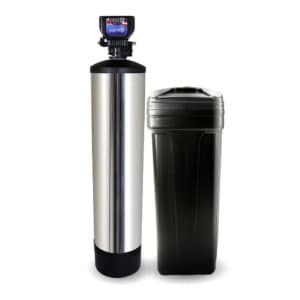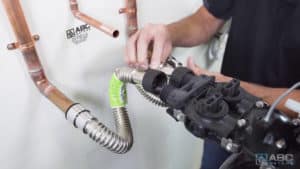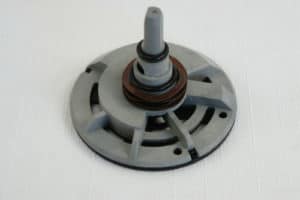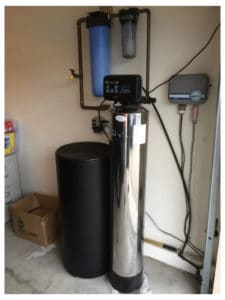We like to share product recommendations with you and hope you like them! Just to make you aware Water Filter Data may collect a small share of sales or other compensation from the links on this page.
Do you have a water softener leaking problem? There is no space for panic, through this article I will guide you on how to detect the reasons and gave solutions on how to fix such situations.
Water softener tank leaking is a common problem and yes, the water softener can leak after years of using it. Depending on how big the leak is it can lead to a more serious problem.

There are some simple reasons why a water softener leaks, but before getting into the fixes it’s important to turn off the water supply and the power supply before starting any repair.
An easy way of detecting a leak is by noticing water around the softener or from the bottom or top of the water softener.
Let’s continue and see if we can identify some of the common problems and find appropriate solutions.
Water Softener Leaking: Reasons And Solutions: Loose Hose Connection
Sometimes the problem can be minor and easily fixable. First of all, check the supply hose pipe that is going in and out of the water softener tank if that’s the spot of leaking simply try to tighten that connection. If it’s still leaking then try replacing it with a new hose.

If this is not the case, there might be something else that’s causing the leakage.
Why Is My Water Softener Leaking From The Drain Line?
Now that we have talked about a few of the primary causes for a water softener leaking from one of its tanks, let’s see for some of the hoses and pipes that connect to the unit.
You can usually find a water softener drain line running near the top of the unit or even further up. If your water softener is leaking from the drain line, this will be hard to miss.
To stop the problem, call a water softener repair expert. They should be able to solve the issue by replacing the faulty plumbing.
Water Softener Leaking: Reasons And Solutions: Rotor Valve
Most of the water softeners located on the very top of the system are bypass systems.
The next thing you want to check is the valve and the o-rings which are located in the rotor.
The water softener Rotor Valve is usually located on the top of the tank, this part is the distributor where the water comes into the machine and often is the source of the leaks, using it for too long may cause some cracks on it leading to leaking.

The solution for this is either to check the seal inside the valve and replace it or to call a professional service which can be useful.
O-rings in bypass valve
Most of the water softeners have a valve that allows water to circulate through the whole system.
O-rings are located on the bypass valve, through the time if you don’t keep them in shape by checking them over time and keeping them functional they get used and get older leading to leaking from the system.
Another thing to consider is that you can service them occasionally by lubricating them and keep them last longer, o-rings life mark lasts more than 15-20 years so you better leave that job to professionals.
If you consider replacing them you will need professional tools and skills so maybe it’s wise to contact an experienced plumber.
Replace the water softener water flow meter
The water flow is measured by a water usage meter. If there’s a defect with the meter then the meter itself won’t detect any water through. In this case, you’ll need to change the meter if you want the water moving through the system otherwise it won’t be working at all.
Consider calling professional service is always the best option if you don’t have professional skills and tools.
No display or screen blackout?
If you have trouble with a blank screen or no display then you should first check the power supply cable.
If the problem still exists then you should try checking the power transformer or a faulty timer caused by electricity disruptions.
No soft water?
Common issues when there is no soft water are probably an empty salt tank which you must consider replacing when needed, depleted resins, clogged or damaged pipes, the broken position of the rotor, and salt bridge.
Punctured brine tank
If you find water leaking from the bottom of the unit then it’s probably a brine tank problem.
The Brine tank is the part of your water softener where you put the salt.
Water softeners work by replacing calcium and magnesium ions with sodium ions in your water.
First, try to solve this problem by contacting the store you bought your water softener.
The issue may be covered under warranty, also some types of epoxy or seal may help to fix the leak for a short time but you risk further damage and malfunctioning of the unit that’s on your own.
Another thing to consider if the leaking is from the bottom, check the inside of the tank commonly when you attempt to clean the tank, don’t use too much force and aggressive moves so you don’t damage the tank.
Avoiding this can save you money and time.
We recommend you replace the tank instead of attempting to repair it.
Water Softener Leaking Overflow
Can you track the water softener drain piping to see where it is connected? If it’s connected right at the sink or trap where the overflow occurred, check further for a blocked part.
If the softener drain is connected to a different building pipe check the building drain system from that point onwards for a blockage or partial drain blockage.
It can be the float tank valve for replacing if it’s overfilling the brine tank.

Check for defections in the lines or valves and clear them out if they are any.
Make sure the drain line is not blocking the flow of the brine line and causing the overflow.
Water Softener Leaking: Reasons And Solutions: Summary
You don’t need to call a professional to fix the common problems that will arise from water softeners.
If you enjoy working in your garage, you will most likely never need to call in a professional unless a leak has decided to flood your basement.
Professionals cost a lot of money, but if you are ever unsure and the simple checks or fixes did not work for the leaks, it is time to call them and have them fix the problem.

Wayne is a water quality expert – The founder of Water Filter Data. He has a degree in microbiology and his field of expertise is drinking water. His goal is to allow for clean and healthy water for as many people as possible.



